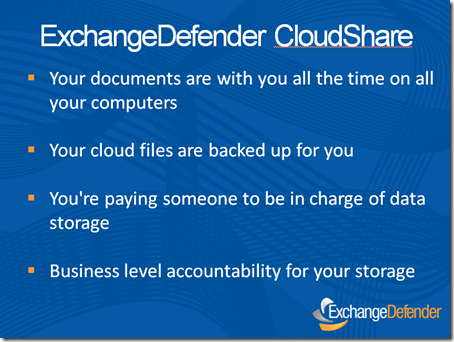The cloud fever has finally made Microsoft’s SMB channel too sick to get out of bed with removal of Exchange, joining virtually every other vendor that is only pursuing a cloud strategy. Many consultants, IT Solution Providers and even yours truly have chimed in on the fact that data retention is extremely important in the SMB world. The typical IT scenario for the cloud in SMB has been to offload some of the Internet-intensive workloads to the cloud: web hosting, email hosting, portals, shopping carts and so on have all gone to the cloud. Small businesses spend a small fortune counting on the cloud for disaster recovery and business continuity.
I think we’ve got this the wrong way.
Client behavior suggests so as well.
If you follow the evolution of servers to the cloud from the late 90’s to today you see that one technology after another has slowly trended towards being more expensive, requiring more redundancy and even more maintenance and upkeep. Each generation, in terms of overall cost for software and hardware, has gone up because client demands have exponentially gone up. I remember talking to many IT folks even in Fortune 500 about their 25 Mb mailboxes. Today, that’s an attachment.
The major concern for IT departments today is BYOD. That stands for “Bring Your Own Device” but what it really means is that another piece of infrastructure is ripped out of control of the IT department. Think about it, if you bring your own iPad with it’s own 4G connection and your 4G Android, do you really need anything from the IT department? Or an IT consultant? As both of those parties fight to stay relevant one ugly truth becomes apparent: The IT has lost control.
Years ago the biggest IT concern was proliferation of hosted services. IT departments didn’t like users using online applications for collaboration or team organization because it made IT departments irrelevant. Departments refused to wait for IT guys to get around to purchasing servers, vetting the vendor, testing the system, deploying it, configuring it and often not being able to support it. So the users went around them – opening up team sites and collaborating through the freebie systems. Today those systems – from Gmail to Facebook – are the norm an IT department cannot fight.
Once people figured out how flexible they can be without the gatekeeper they couldn’t get enough of it! Yes proxies and active directory restrictions could keep people in check for a while but even Microsoft killed ISA a long time ago. If even the biggest software manufacturer in the world sees no ability to make money on giving companies the ability to police traffic that ought to give you a big enough sign of what the businesses really demand.
In essence, it’s productivity.
So what do we have wrong?
I think we got the cloud file storage thing figured out backwards.
The entire cloud is racing towards creating a cheaper storage product. Amazon Web Services is battling Rackspace who is fighting with Microsoft Azure and they are all trying to figure out a way to split pennies. Meanwhile, they from time to time lose data and woops, thanks for playing, it’s gone.
How can they get away with it? Simple – their largest customers aren’t small businesses storing precious data. They are social media sites storing political cartoons and memes. Losing your tax records is no joking matter tho.
So what do we have in SMB? We have a ton invested in file servers and we’re spending a fortune to create business recovery scenarios with expensive offsite backups. Or we’re dropping it off into unreliable and unknown void of the cloud – with storage products that have no stated data destruction policies, no security disclosures, proprietary mechanisms that make it difficult to take data out and even some of the most heralded solutions happen to lose data.
This is a broken model.
Small business has to spend an insane amount of money to create reliable local infrastructure. First you need enterprise quality disks. Then you need RAID hardware. Finally, you need some sort of backup software/solution often paired with a BDR with an offsite provider. You need this.
So congratulations, for every bit of data you store you’re paying at least 4x (on your workstation, 2x on your servers mirrored hard drives, 1x on your BDR and 1x in the cloud). That’s if the data isn’t also backed up to a USB disk or using RAID10 or something more sophisticated.
The flexibility you get with that data to follow you from PC to PC if you work from home? None. Audit control over the server? Very complex. Access logs of what is touched when in the cloud? Damn near none. And that’s if you deal with reputable people, not Jimmy Joe Bob’s Bait & Tackle Cloud Storage Specialists (I miss my brother Chris Rue).
I think there is a better way.
If all the worlds vendors are hell bent on removing servers from SMB, it just doesn’t make sense to move your storage to the cloud. Seriously, would you keep your money in the worlds cheapest fee bank? Why do you pay for a safety deposit box instead of keeping your valuables in a storage locker at a 24/7 UPS store? Because you value security. And redundancy. You don’t want to drive up to a bank tomorrow and realize that it’s single branch has been turned overnight into the Waffle House.
It’s easy to build affordable and scalable stuff in the cloud. But you’re not going to trust the cloud with your data any more than you’re going to trust the Waffle House Credit Union.
So what if the cloud were merely a backend for your file exchange. Instead of keeping files in a web interface, you keep it on your hard drive and the software on your PC simply syncs it to the cloud provider. If they blow up… ah well, you still have your data. If you blow up, no big deal, just download it from the cloud.
In the meantime, your operations don’t change. Everything looks the same as before, works as fast as it did before because the files are local. The only thing that changes is where this data goes.
But you still can’t trust them..
So what if instead of spending thousands of dollars on file servers that you don’t need and can never pay enough to keep as redundant and as resilient..
.. you keep your data in the cloud but get a cheap appliance that just streams down the cloud content back down to you so you can always keeps hands on your data but never overspend to keep it safe?
It’s what users want. The cost of the cloud for the enterprise storage.
Only problem is, no vendor will want to build a system that takes them out of the service equation or perpetual service subscription. It’s easier to just keep on cutting a cent off the storage fees and hope the cuts are slower than the tumbling cost of storage density. Well, maybe there is someone crazy enough to do it.
The Only Thing I Know For Sure
You will never get it wrong if you deliver what people ask for. 
P.S. The comments are closed and you know why… If you have a comment please email me at vlad@vladville.com or tune in to your favorite news site this Thursday.









 For the less coherent, more grammatically correct realtime insight, follow me on Twitter at
For the less coherent, more grammatically correct realtime insight, follow me on Twitter at